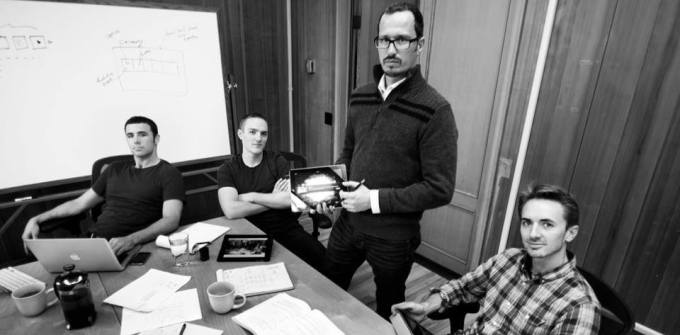Famo.us’ 15 minutes of open source fame have come to an end. JavaScript rendering engine Famo.us has pivoted away from its hardcore open sourced engineering platform which had raised over $31 million. It’s now refocused on commercializing the idea of powerful mobile web apps with a content management system for branded marketing apps.
The startup changed its website to famous.co, stuffed its old open source information on famous.org, and laid off a big chunk of the team, including its VP of Engineering, Head of Open Source, and a dozen engineers. But at least now Famo.us has the runway to take another shot at the spotlight.

The Pivot Before The Pivot
Famo.us’ ambitions were always lofty and a bit tough to explain. During the company’s debut on stage at TechCrunch Disrupt SF 2012 Startup Battlefield competition, rather than giving a traditional pitch, Famo.us CEO Steve Newcomb spent his whole six minutes asking people to imagine what could be done if apps were 3D instead of 2D and demoing a floating periodic table.
The judges seemed baffled, as you can see below. That’s in part because just days earlier, the team made its first pivot away from what it called BenchRank, a ranking system for people, into an HTML5 development platform. Newcomb and then-intern Mark Lu found they couldn’t build what they wanted with HTML5’s limitations, so they set out to fix them. That led co-founder Dan Lynch and much of the team to depart, leaving Newcomb and Lu to handle Disrupt.
HTML5 has since lost some of its luster. But back in 2012, there was a lot of hope for the mobile web platform. despite its mediocre performance compared to native apps. Famo.us promised a solution.
By bypassing the CSS and HTML renderers to talk directly to the graphics processing unit, Famo.us could supposedly make 3D physics and other visual wizardry common with native games run smoothly for apps in a mobile or web browser. Coders wouldn’t have to learn whole new mobile languages. They could just code in JavaScript.
And the idea was that much of Famo.us and what was developed with it would be open sourced, allowing the community to build on each others’ creations.

Raising On A Dream
“We built a shitty game engine, which is basically the best app engine ever built,” Newcomb told TechCrunch.
 Though it was tough to tell if Famo.us would work, investors gave it the benefit of the doubt. That was in large part thanks to Newcomb, who had sold his last startup, natural language search engine Powerset, to Microsoft for $100 million. In early 2013, Famo.us added a $4 million Series A from Javelin Venture Partners and Samsung to its $1.1 million in seed funding from Greylock, Naval Ravikant, Roger Dickey, [and, disclosure, TechCrunch founder Michael Arrington’s CrunchFund].
Though it was tough to tell if Famo.us would work, investors gave it the benefit of the doubt. That was in large part thanks to Newcomb, who had sold his last startup, natural language search engine Powerset, to Microsoft for $100 million. In early 2013, Famo.us added a $4 million Series A from Javelin Venture Partners and Samsung to its $1.1 million in seed funding from Greylock, Naval Ravikant, Roger Dickey, [and, disclosure, TechCrunch founder Michael Arrington’s CrunchFund].
But Newcomb’s quest to redefine mobile with open source threatened to make Famo.us unsustainable. He told TechCrunch when announcing the funding, “That lean startup style — I don’t believe that” and that he was purposefully trying to be a perfectionist.
Newcomb knocked down the wall between his San Francisco penthouse apartment and the one next to it to create a lavish office for Famo.us. When TechCrunch reporter Anthony Ha visited, Newcomb pointed to some desks that seemed adequate, but insisted they would be replaced soon because they weren’t the right kind of wood.
He told Ha that since Famo.us was a platform for building beautiful apps “everything we do has to represent perfection and elegance.” You can take a tour of the office in TechCrunch’s Cribs video above.
Open Source ≠ Business
Over time, the plan for Famo.us’ business model evolved from selling development assistance to big hardware vendors, to combining that with cloud services like hosting, A/B testing and monitoring. The company only let a trickle of the tens of thousands of wait-listed developers onto the platform. Still, it was stoking curiosity with sizzle reels like the one below, and making good hires like Facebook mobile engineering manager Dave Fetterman as its VP of engineering.
By August 2014, Famo.us had grown to 25 employees and had 90,000 sign-ups for the platform, still awaiting the finished platform’s public open source release. It managed to raise another $20 million plus $5 million of debt from New York’s Insight Venture Partners. Newcomb told VentureBeat it planned to hire up to 40 more staffers with that cash, though Fetterman departed.
Finally, in June Famo.us “launched.” From a different site Famous.org, it fully open sourced its Engine that improves performance for hardware, and its Framework for integrating Famo.us into apps with blog posts by Myles Borin and Zack Brown.

But sometime since them, Famo.us hit a wall, and painful changes would be necessary for the startup to survive.
The Tough Decision
I spoke to Newcomb, who confesses that for six months the company struggled to come up with a way to actually earn money. A source close to the company tells me Newcomb pushed the engineer-heavy company into “ideation mode” that made some employees feel like the startup lacked direction. They described engineers as being “fed up.”

Newcomb himself admits it was a “divergent brainstorming process,” saying “We tried everything…we tried everything so we could create a business model around open source. And at the end of the day, we just couldn’t do it.”
That led to a brutal decision to change the company’s direction. “I thought it was going to be a tough economy coming up,” and Famo.us needed to be sure it had years of runway, Newcomb says. “If you are only an open source project, after a while you’ll be burning too fast.”
The only answer was to suspend the open source initiative, thin out the team, and devote everything toward a product Famo.us could actually sell. “It’s a pivot away from open source and towards a commercialization of our project.”
Newcomb describes it as “one of the toughest decisions I’ve ever had to make because it meant letting go of some people.” Stressing the firings weren’t easy for him. “Before I made the decision, I drove scar from San Francisco to Baltimore and back to think it through,” he explains. “I took eight days.”
He refused to tell me the exact number of layoffs, but noted “there was a good-sized team that we let go.” The shift away from open source left “some employees upset” and that “the open source community wasn’t very happy.”
According to LinkedIn, here’s a list of staff members who departed Famo.us and over the past few months, some of whom Newcomb confirmed were laid off:
- Myles Borins – Head of Open Source – September 2015
- Bart Jansen – Founder & Engineer at Famo.us Creative – September 2015
- Sander Frans – Global Creative Director – September 2015
- Daniel Miller – Core Platform Engineer – September 2015
- Trevor Bossert – Lead Development Operations Engineer – August 2015
- Morgan Plant – Curriculum Software Engineer – August 2015
- Adrian Johnston – Senior WebGL Engineer – August 2015
- Matthew Trost – Software Engineer – August 2015
- Mei Chen –Technical Recruiter – August 2015
- Zack Brown – VP of Engineering – July 2015
- Larry Gordon – Head of Famo.us Creative San Francisco – July 2015
- Joseph Sample – Software Engineer – July 2015
- Mike Xia – Creative Engineer – July 2015
- Ben Rowles – Software Engineer – June 2015
- Marc Wilhite – Creative Engineer – June 2015
- Sharadha Ramakrishnan – DevOps Engineer – May 2015
- Adam Cmiel – Software Engineer – May 2015
- Felix Tripier – Software Engineer – May 2015
Then sometime in the last few months Famo.us started redirecting to the startup’s post-pivot site Famous.co.
The New Famo.us
There the company laid out an entirely new business: “Our mission at Famous is to empower digital marketing professionals to build beautiful branded apps that amplify every aspect of their digital marketing campaigns.” The product is a content management system for digital marketers. It allows them to create “micro-apps” that are basically mobile-optimized websites that can be easily shared and opened without being installed like a native app.
Newcomb tells me the new commercialized form of Famo.us will launch November 20.

The product leans on some of the old Famo.us research into simplified rich media app creation, though now it’s for non-coders rather than JavaScript wizards on the graphics frontier. Newcomb writes on the new homepage: “What makes our product offering unique is that our apps can be built without coding.”
The new Famo.us still aligns with the goal of making the mobile web more powerful, though it’s a far cry from open source hacking on the infrastructure of the web.
Newcomb defends the pivot, saying “it hurt, it was a big part of my life,” but that “we made the moves we did in order to avoid being one of those companies that’s in trouble money-wise.” He references Google raising a bunch of money before the dot-com crash as why Famo.us suddenly grabbed $25 million last year and laid off everyone unessential to its future.

“We have about five years of money in the bank, so now it doesn’t matter what happens in the market,” he says. Supposedly its lavish office space is now 30 percent beneath market rates per square foot in San Francisco, though rent is so crazy there that the price still isn’t cheap. But at least now Famo.us’ path to monetization is clearer than it’s ever been. Businesses will pay for fast-loading, beautiful mobile web apps when they’d never pay for the old Famo.us.
Silicon Valley prides itself on embracing failure as an inevitable risk of trying to do something big and important. And some pivots, like Slack morphing from a game company to an enterprise chat tool, have turned into enormous successes.
But sometimes the pursuit of beauty, perfection and community can throw a wrench in the gears of innovation. Money burns as momentum slows. Launches get pushed back and talent flees. Sometimes it takes brutal layoffs and ideological shifts to get a startup back on track.
Now Famo.us will have to do everything it can to make its extended runway worth the team members it sacrificed.































Comment